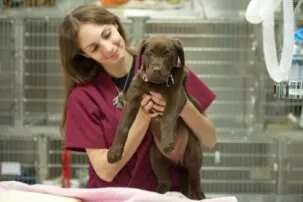Veterinary technologists and technicians are skilled professionals who work closely with veterinarians to provide medical care for animals. They perform a wide range of tasks to assist in the diagnosis and treatment of animals, as well as in the overall care and well-being of the animals in their charge.
Veterinary technologists and technicians typically work in veterinary clinics, animal hospitals, research facilities, and other animal care settings. They may also work in zoos, wildlife rehabilitation centers, or other organizations that work with animals.
Some of the key responsibilities of veterinary technologists and technicians include collecting and analyzing laboratory samples, administering medications and treatments, assisting with surgical procedures, taking and developing x-rays, and providing nursing care to animals. They also play a crucial role in educating pet owners about proper animal care and handling.
To become a veterinary technologist or technician, individuals typically complete a two or four-year program at a college or technical school accredited by the American Veterinary Medical Association. They may also need to pass a credentialing exam in order to become certified or licensed in their state.
The work of veterinary technologists and technicians is physically and emotionally demanding, as they often work with animals that are sick, injured, or in pain. However, for those who are passionate about animals and their well-being, this career can be incredibly rewarding.
Overall, veterinary technologists and technicians play a vital role in the field of veterinary medicine, providing essential support to veterinarians and helping to ensure that animals receive the best possible care.

